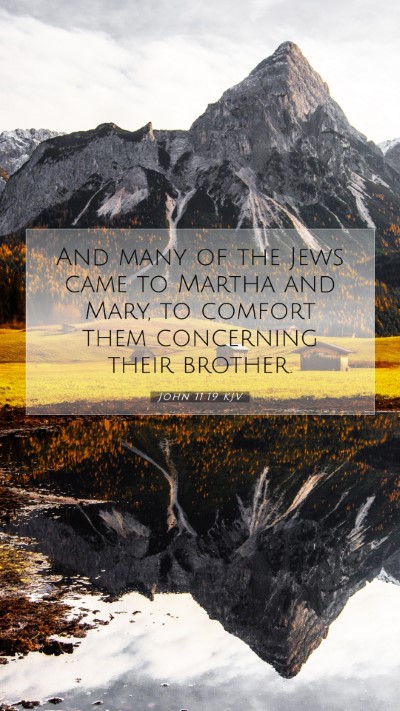Understanding John 11:19
John 11:19 reads: "And many of the Jews came to Martha and Mary, to comfort them concerning their brother." This verse is situated within the larger narrative of the death and eventual resurrection of Lazarus, which holds profound significance in the Gospel of John.
Bible Verse Meanings
The verse underscores the communal aspect of mourning in Jewish culture. Martha and Mary, grieving the loss of their brother Lazarus, attract visitors who come to provide consolation. This highlights the human need for support during times of sorrow, reflecting the heart of community life.
Bible Verse Interpretations
Various commentaries provide insights into this passage:
- Matthew Henry: Emphasizes the importance of friends in times of grief, noting that the Jews' visit demonstrates a communal bond and the shared experience of mourning. They play a significant role in providing comfort, which alleviates the pain of loss.
- Albert Barnes: Highlights that this gathering signifies the customs of the time, where friends and relatives would come together to mourn a deceased individual. He notes that such gatherings were essential in Jewish culture and served as a source of support for the bereaved.
- Adam Clarke: Focuses on the emotional weight of the moment, stating that the act of coming together to comfort reflects a compassionate response to grief. Clarke also indicates that the presence of these comforters sets the stage for the miraculous events to follow, thus intertwining mourning with hope.
Bible Verse Understanding
Understanding John 11:19 requires recognizing the social and cultural practices of the time. Mourning was communal, and the visit of many Jews illustrates shared sorrow, a vital aspect of healing and support in difficult times.
Bible Verse Explanations
This verse serves not only as a record of historical mourning but also as an introduction to the miracle that Jesus will perform in raising Lazarus. The communal mourning lays the groundwork for displaying Jesus’ power over death, foreshadowing the ultimate victory over mortality which is a key theme in the Gospel of John.
Scripture Analysis
The context of John 11 is critical for deeper scripture analysis:
- It begins with the death of Lazarus and the emotional responses of his sisters. Mourning serves as a backdrop for the subsequent miracle, making it all the more poignant.
- This passage illustrates how grief can be not just personal but communal, thereby emphasizing the need for connection and support.
Biblical Exegesis
Through biblical exegesis, one can discern the meaning and implications of this verse:
- This setting prepares the reader for a significant theological revelation about Jesus. The morale challenge of dealing with loss is met with Jesus’ authority over life and death.
- The dynamic of Martha and Mary, both responding differently to Jesus, further enriches our understanding of individual grief and faith.
Bible Study Insights
For those engaging in a study of this passage, consider the following insights:
- The humanity of Jesus is displayed in His compassion and empathy towards grief.
- Reflect on how community support during times of loss plays a crucial role in healing processes.
- Think about the significance of resurrection not just as a future promise but a current hope in Jesus’ ministry.
Cross References
Related Bible verses that enhance the understanding of John 11:19 include:
- John 11:33-35: Jesus weeps, highlighting His empathy.
- Luke 7:13-15: The story of the widow of Nain and Jesus bringing her son back to life.
- Romans 12:15: "Rejoice with those who rejoice; mourn with those who mourn."
Conclusion
In summary, John 11:19 serves as a poignant reminder of the importance of community during times of loss, and it introduces the miraculous nature of Jesus' ministry. Understanding this verse within its context provides deeper insights into the nature of grief, the need for support, and the hope embodied in Christ.


